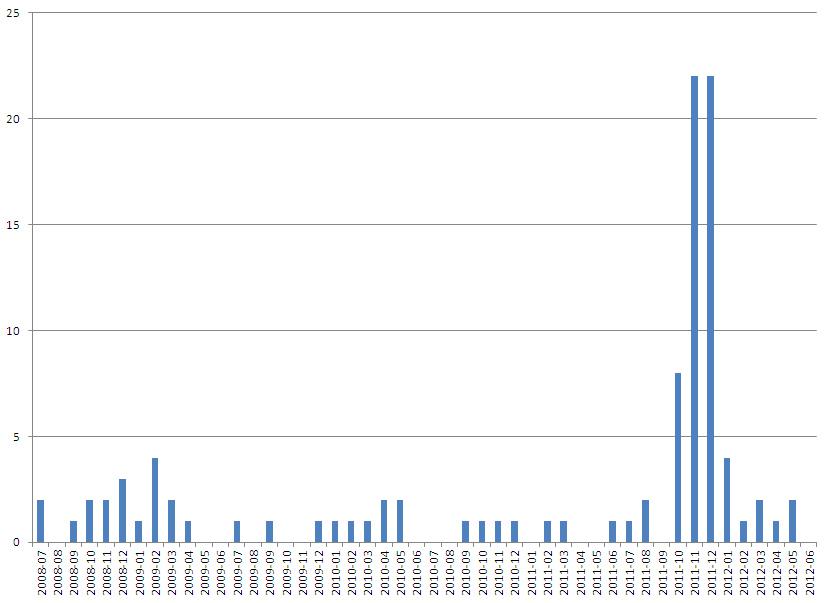HFC lobby endangers efforts to protect climate, new research shows
Brussels, 13 September – Lobbyists representing chemical companies and manufacturers of air conditioning equipment, cooling systems, heat pumps and refrigerators from around the world are targeting Brussels in an attempt to block regulation of damaging hydrofluorocarbons (HFCs), one of the fastest growing sources of greenhouse gas emissions in the world.
Last week the European Commission’s DG Climate Action submitted new legislative proposals on HFCs to inter-services consultation, which means formal talks have started internally in the Commission – a crucial phase before the legislative proposals are finalised and launched by the Commission, probably in late November.
New research by Corporate Europe Observatory (CEO) has found that as many as 353 industry lobbyists, many representing companies based in North America and Japan, have registered in Brussels as part of a campaign to undermine this new EU legislation on HFCs 1. More than half of these companies and industry platforms registered en masse to the EU Transparency Register at the end of 2011 2.
For instance 14 European subsidiaries of the Japanese air conditioning giant Daikin joined the register between 2-18 November 2011. Overall, Daikin – which also manufactures HFCs in its own chemical plants – had 50 lobbyists registered at the end of 2011. Big HFC manufacturers like Honeywell, DuPont, Arkema, Solvay and Mexichem are also heavily engaged in the lobbying battle.
HFCs, widely used as refrigerants in air conditioning and refrigeration equipment, have a global-warming-potential thousands of times higher than carbon dioxide, but are still currently allowed on the market in the European Union.
Environmental campaigners and a handful of industry lobbyists promoting alternative refrigeration systems are calling for an outright ban on these super greenhouse gases in the new legislative proposals – but their voices and spending power are outnumbered by at least 1:10 by the mainstream HFC industry, the report finds3
Report author David Leloup said:
“This is a classic case of vested interests in industry mobilising massive financial resources to block effective climate regulation. Industry lobbyists are targeting the EU in a bid to be able to continue with business as usual, regardless of the fact that safe, cost-effective alternatives are readily available on the market, and regardless of the devastating impact on the climate.”
HFCs fall under EU Regulation 842/2006 which is now under review. Back in 2006, the HFC industry lobby, led by the European Partnership for Energy and the Environment (EPEE), won the first lobbying battle and avoided a ban on HFCs by moving the focus to containment and recovery measures – i.e. preventing and minimising leakage, and capturing and destroying HFCs when the equipments reach the end of their lifetime.
Now the Commission has a unique opportunity and responsibility to design an ambitious EU regulation to ban these super greenhouse gases. Such a move could facilitate and drive international talks under the Montreal Protocol to regulate HFCs at the global level.
HFCs and other F-gases contribute around 2% of EU greenhouse gas emissions today – a figure likely underestimated because of unreported leaks4. If business continues as usual, estimates suggest this conservative 2% figure could account for up to 20% of projected global greenhouse gas emissions5.
ENDS
Contacts
Olivier Hoedeman, Corporate Europe Observatory (English, Dutch)
Mobile: +32 (0)474 48 65 45 – Landline: +32 (0)2 893 09 30
- 1. Climate bombs called HFCs – How the industry lobby is trying to block a phase-out of super greenhouse gases in Europe’s refrigeration and air conditioning systems, Corporate Europe Observatory, 13 September 2012.
- 2. Monthly registrations of F-Gas Regulation industry stakeholders to the EU Transparency Register spiked during the last quarter of 2011:

- 3. 100 registered HFC industry organisations identified by this research have declared a total lobbying budget of €23.9 million. In contrast, eight organisations representing environmental interests active on HFCs have declared €2.2 million, while eight companies or industry platforms supporting natural refrigerants have declared €0.9 million.
- 4. Europe emits huge unreported F-gas cloud: Report, EurActiv.com, 26 August 2011.
- 5. The large contribution of projected HFC emissions to future climate forcing, Guus J. M. Velders et al., PNAS, 22 June 2009.
